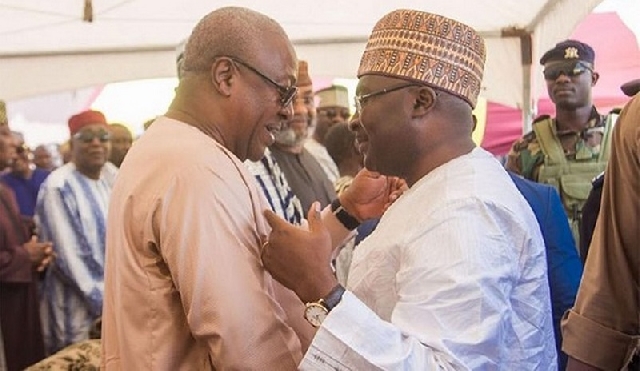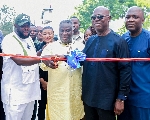Despite war, pandemic-induced crisis, our economic performance far outshines Mahama's – Bawumia
 L-R: John Mahama and Dr Bawumia
L-R: John Mahama and Dr Bawumia
Data shows that the economy is recovering from the crisis Ghana faced in the heady days of the COVID-19 pandemic, New Patriotic Party flagbearer Mahamudu Bawumia has said.
Outlining his vision for Ghana on Wednesday, 7 January 2024, Dr Bawumi said Inflation has declined from 54% in January to 23% in December 2023.
Economic growth is "rebounding", he added, noting: " Spending is under control with the fiscal deficitas a percentage of GDP has declined from 10.8% in 2020 to 4.2% in 2023."
Also, he said that the debt-to-GDP ratio, after increasing from 61.2% in 2019 to 76.6% in 2021 has declined to 66.4% in 2023.
"And exchange rate depreciation has also slowed downsharply since February 2023, whereas the exchange rate depreciated by 30% in 2022, between February and December 2023, it only depreciated by 9%", he announced.
He said despite the crisis, the current economic performance outshines that of the Mahama administration which the Akufo-Addo government inherited in 2017.
"What is remarkable is that notwithstanding the domestic and global crisis that we have experienced between 2020 and 2022, the economic performance, as measured by the key economic indicators (such as GDP growth, Agricultural growth, industry growth, Trade Balance, Exchange rate depreciation, lending rates, Gross international reserves and jobs) is better than that of the 2013-2016 period when there was no global crisis."
Let me give some examples:
GDP growth
On GDP growth, it is worth noting that between 2013-2016, Ghana’s GDP growth averaged 3.9%. During our first term (2017-2020) GDP growth increased to an average of 5.3%. Following COVID-19 and the global slowdown, Ghana’s GDP growth declined to an average of 4.9% between 2017 and 2022.
What is remarkable about this performance is that notwithstanding the global economic crisis from COVI-19 and the Russia-Ukraine war, economic growth under our government is still stronger on average than under the 2013-2016 era preceding our coming into office.
Agricultural Growth
The stronger GDP growth performance in the 2017-2022 period is underpinned by a strong agricultural GDP growth which increased from an average of 2.9% between 2013-2016 to an average of 6% (double) between 2017 and 2022.
We have made a lot of progress in agriculture even though there is more to be done. Rice imports for example have declined by 45% (from 805,000MT to 440,000MT) between 2021 and 2023!
The goal is to be a net exporter of rice by 2028. It is clear that some of our policy interventions such as planting for food and jobs have born fruits.
Industry
Industrial GDP growth also followed a similar trend. After averaging 3.3% between 2013 and 2016, industrial growth increased to an average of 7.5% between 2017 and 2020.
Industrial Growth however declined after the global crisis with a recorded average growth rate of 5% between 2017 and 2022.
Again, what is remarkable about this performance is that notwithstanding the global economic crisis from COVI-19 and the Russia-Ukraine war, industrial growth under our government is still stronger on average than under the 2013-2016 era.
Our programmes and policies such as the revival of Anglogold Ashanti (Obuasi mine), revival of Ghana Publishing Company, revival of Ghanapost, revival of State Housing Corporation, revival of State Transport Corporation, IDIF, and the attraction of international automobile companies to Ghana, amongst others have clearly yielded positive results.
The Ministry of Trade reports that under IDIF, 169 factories are currently in operation and 152 factories are under construction. 211 out of the total of 321 (66%) are new projects whist 110 companies are existing projects being supported.
Trade Balance
Ghana’s trade balance (the difference between exports and imports) prior to 2017 was in persistent deficit (for best part of 30 years!). Between 2013 and 2016 the trade deficit averaged $2.5 billion.
The trade balance improved significantly to a surplus that averaged $1.8 billion between 2017 and 2020.
Notwithstanding the global crisis, Ghana has continued to record a trade surplus which has averaged $1.9 billion between 2017 and 2022, a better performance than in the 2013-2016 period when there was no global crisis.
This is evidence that we have indeed increased productivity and exports relative to imports.
Gross International Reserves
Ghana’s gross international reserves also increased from an average of $5.8 billion in the 2013-2016 period to an average of $7.9 billion between 2017 and 2022.
Exchange Rate
On the performance of the cedi exchange rate, it is interesting to note that between 2013 and 2016 the cedi depreciated by an average of 17.7%. Between 2017 and 2020
there was a significant decline in the cedi depreciation to an average of 7.5%.
The average cedi depreciation further declined to 6.8% between 2017 and 2021. However, following the 30% depreciation of the cedi in 2022, the average cedi depreciation between 2017 and 2022 is 10.75%.
So, again, notwithstanding the domestic and global economic crisis, the depreciation of the cedi under our government is lower than what we inherited from the 2013-2016 period.
Jobs
What is probably the most remarkable development in terms of the economy is that our government has created 2.1 million jobs between 2017 and 2022 notwithstanding the global economic crisis.
The public sector recruited 1.2 million people while the private sector created 975,000 jobs (per SSNIT data).
We recruited 100,000 more health workers, 100,000 more teachers, more than doubled the fire service personnel, etc.
Our government has quite clearly created more jobs in a seven year period than any government.
This is truly remarkable under the circumstances even though we still have to create more jobs.
Clearly, notwithstanding the economic crisis, this government has been able to steer the ship of the nation away from catastrophe. In the face of the crisis, the overall performance of the economy in areas such as GDP growth, agricultural growth, industrial growth, trade balance, gross international reserves and job creation demonstrated resilience.
Available data also shows that notwithstanding the challenging economy we inherited, and the global economic crisis that ensued, government has chalked a large number of achievements across the country. Due to time constraints, I will not be able to enumerate all these achievements.
However, government will soon outdoor our Performance Tracker which details all of our achievements in every sector and every district in Ghana. I will just name a few:
Undertaken a major roads construction and rehabilitation programme across the country (over 11,674 Km according to the Ministry of roads and highways). I am not aware of any government that has done as much in the roads sector since independence.
Source: classfmonline.com
Trending News

Foreign Affairs Minister invites family of dead Latvia student
02:53
Margins ID Group unveils Kinbu Triangle Green landmark in 30-day urban regeneration drive
18:29
Commercial drivers laud NPA CEO for stable fuel prices
08:49
NPA Case: Mustapha Hamid files application to strike out charges against him
07:20
Court slams Angel Asiamah with GHS12,000 fine
03:03
Fire guts mobile money and phone shops at Kasoa Walantu, two injured
02:29
GFL Secretary-General calls for urgent resolution of TDC–TMA permit dispute
08:15
Foreign Affairs Minister presents six new buses to Ministry staff
08:16
Sir Sam Jonah cries to gov't over alleged seizure of investments in Nigeria
07:14
Why Ofori-Atta can't be extradicted by US: Supreme Court affirms validity of 1931 US–UK extradition treaty in Ghana
02:41




